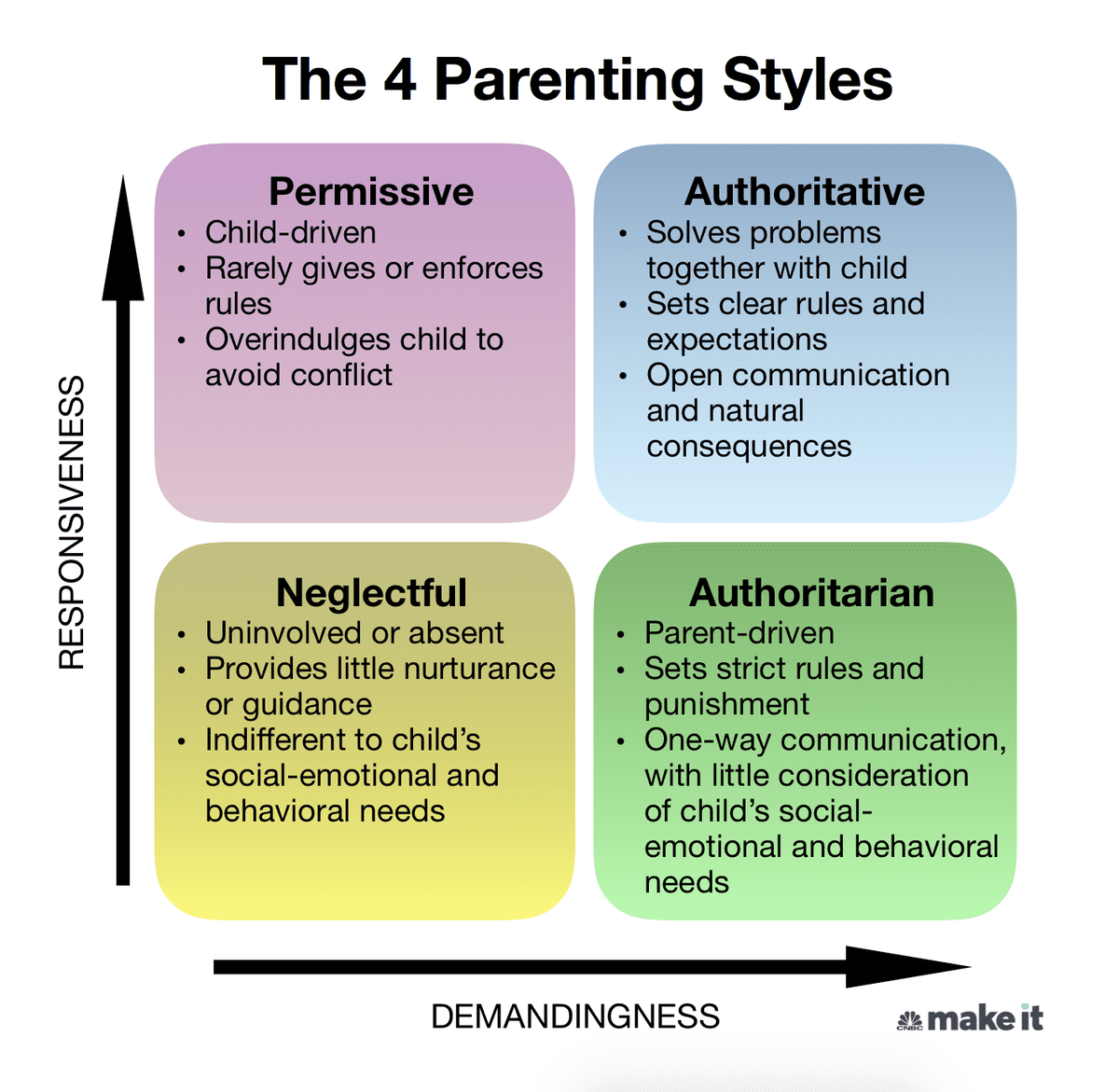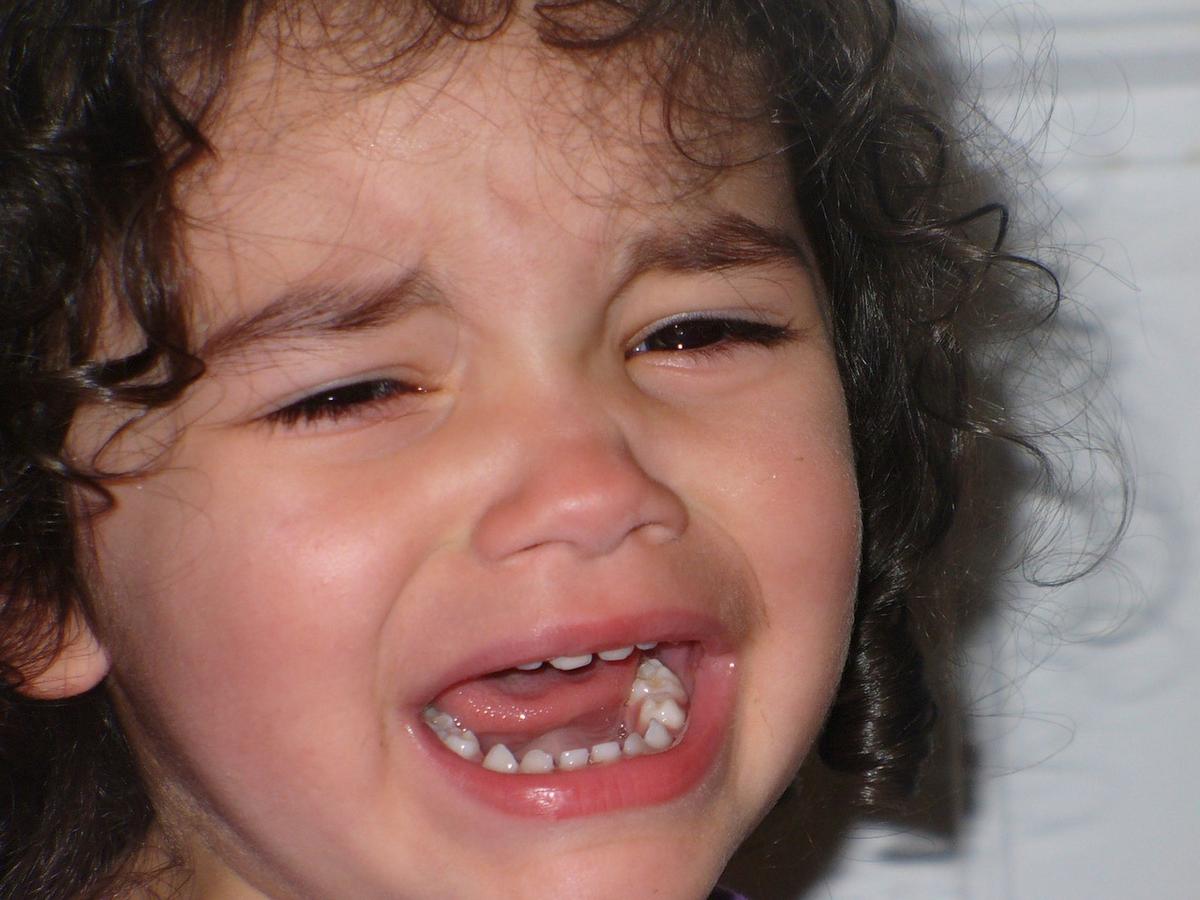WELLBEING

The Wellbeing Hub
From The Counsellor’s Desk
The Four Parenting Styles
Maccoby and Martin (1983) created a 2 dimensional framework to categorise parenting styles. There is a wealth of research looking at the effects of parenting styles on child development and behavioural outcomes that all parents should be aware of. The four parenting styles are:
This is a neat way of conceptualising the different parenting styles and helps us understand the salient features of each style and their potential effects.
Authoritarian
Authoritarian parents are high on demandingness but low on responsiveness to the child's emotional needs. This makes for a parenting style that is parent driven, where the parent sets strict rules and punishments and can come across as harsh or overly controlling. Children often feel unloved and not listened to as their parents generally show little regard for the child’s social emotional and behavioural needs.
Permissive
Permissive parents on the other hand are low on demandingness and high on responsiveness. Parents in this category are child centred, rarely give or enforce rules, and overindulge the children to avoid conflict. You often see this as a reaction against parenting that is overly authoritarian. Parenting today often tends this direction with parents feeling like they should allow their children to do anything they wish.
Uninvolved/Neglectful
These are parents that place very few demands on their children and show very little care for their social-emotional or behavioural needs. This is often found in situations where parents are too busy with their career to spend time with their children or are struggling with mental health issues and/or are otherwise unable to provide much care or attention to their children.
Authoritative
Authoritative parents are high on both demandingness and responsiveness. They show lots of care for the emotional and social wellbeing of their children but also expect a lot from their children. This is the parenting style that routinely produces the best outcomes for children and for their relationships with their parents. Children are listened to and their needs heard and a lot is also expected of them.
Authority:
Parenting styles have a huge impact on a range of developmental and behavioural outcomes for children; a good example of this is their attitudes toward authority.
Why Should We Submit to Authority?
Fundamentally submission to authority is essential for the proper functioning of society. Without at least some level of submission all we have is anarchy. In Australia we are very fortunate that by and large we are served well by our leaders and most of the time our laws are good laws put there to protect us and to help us thrive as a society. Laws preventing speeding and drink driving protect us on the roads. Laws prohibiting illegal drugs are designed to protect us from unnecessary exposure to dangerous substances. Laws about the age at which you are allowed to drink are designed to protect us from damaging our cerebral cortexes while they are still developing.
These things are there for our good. Teaching our children to obey authority is helping to protect them and the society they are a part of. “What about taxes? How are they for our good?” I hear you ask. The money paid to the government in tax goes to building roads, hospitals, schools, supporting the poor and marginalised, helping widows and orphans, pays for defence of our country and aids those effected by natural disasters, it puts out fires and protects our citizens from murder and theft. I have heard it said that for most people, the money they pay in tax is the most well invested money they ever spend.
Submission to parents is the foundation upon which all other submission is built. In essence submission to your parents is practice for submission to teachers, government, police and ultimately to God (so kind of important).
What Impact Does Parenting Style Have On Submission to Authority?
Authoritarian
Submission is a concept that is abhorrent to many of us and that is because we are so used to the misuse of authority. When we have been poorly led by people in authority over us or those in authority have oppressed us and treated us harshly then we may develop an attitude that wants to reject all authority and consider our leaders as our opposition rather than our allies.
When a child is treated harshly by their parents and the discipline they receive is not loving correction for their good, it can make them push against legitimate authority and lead to all sorts of issues at school with their teachers, with employers at work and even with the police. Some children can be so affected by authoritarian parenting that they are blind to the care and concern offered by dedicated teachers who really do want the best for them, instead seeing them, by virtue of their position, as the enemy.
Permissive
While children with permissive parents have the advantage that they feel loved and cared about, overly permissive parenting can also lead to devastating consequences in the lives of our children in the area of submission to authority. Children need boundaries and consequences. We do a great disservice to them by not guiding them as we should. Without discipline our children have real difficulties navigating the world. We set them up to be seen as naughty kids because right from the start they unintentionally act like “shiftless wild hobos” as Talladega Nights so eloquently puts it. Or alternatively they just become entitled and spoilt, thinking that the world should revolve around them and their moods. Their misbehaviour makes them immediately at odds with authority figures and they may feel like the world is against them. Once again the authorities begin to look to the children very much like the opposition rather than allies.
Uninvolved/Neglectful
Uninvolved or neglectful parenting can have an effect akin to permissive parenting. Often the lack of direction and boundaries can create difficulties for children by making them unaware of socially acceptable patterns of behaviour. Paradoxically however children of uninvolved parents can on occasion respond quite well to teachers and other authority figures who have an authoritative style. Often children in this position appreciate their teacher’s interest in their social-emotional wellbeing and respond very well to the clearly articulated boundaries they so desperately need.
Authoritative
Authoritative parenting is a parenting style characterized by high responsiveness and high demands. Lots of love and lots of expectation is the key. If you show your children that you love them then they will be much more disposed to submitting to you. Because of this pairing of love and authority children learn to see authority as it should be; wielded for the good of those under it. As in so many things, Jesus is the perfect example of this type of authority. He clearly articulates God’s expectations and holds people to account for their rebellion yet at the same time treats his people with extravagant grace and mercy. His amazing love for his people (seen at the cross) make it easy to submit willingly to his authority. You can trust that he has your best in mind.
That is how it should work with parenting also. Authoritative parents show their deep love and care for their children and that is the fundamental reason that the children trust their directions and discipline. They know it is for their good.
Taking this attitude forward the children of Authoritative parents are more likely to listen to instruction and follow it. This makes them well thought of and respected by those in authority and makes their lives much easier. When there are disagreements with authority these children are taken seriously and listened to because of their ability to have discussions about the rules without disrespect.
How it works in my house
When my children were very young there were times when they didn’t really know what was best for them… come to think of it, there are times for all of us when we don’t know what is best for us, even as adults. When things got crazy in our house one of my techniques was to get down to their level, look them in the eye and hold their hands. I would then calmly ask them “Who am I?”. “You’re my dad” they would say. “How do I feel about you?” I would ask. “You love me” they would say. “Then what are you going to do?”I would ask. “Obey you” they would say (most of the time).
The genuine love and care that parents have for their children gives them a level of warrant or relational capital that (when exercised properly) should allow children to willingly submit to their authority. When they feel loved by their parents, children know that listening to them is the right thing to do. If you are convinced that those in authority have your best interests at heart then obedience to them is a much more attractive proposition.
The Goal
The aim of our parenting is that by the time they’re 18 we can present fully functioning adults to the world. As time goes on the children in Authoritative households have more and more say in decisions and rules and eventually are competent and able to be trusted with all the decisions that affect their lives. This is a gradual process and can happen in line with the maturity and responsibility of the child.
Parenting well in the areas of authority and discipline is essential because obeying parents is practice for obeying every other authority your kids will encounter in their lives and ultimately it is practice for obeying the God of the universe.
As parents we must, in love, set clear boundaries and expectations for our children and exercise our authority with wisdom, grace and justice. Sounds easy :)
God bless.
Michael Lance | College Counsellor
Around the Houses
Blackwell House
Introducing the New Leaders - Blackwell House
Hi everyone! We are Isaac Collingridge and Isobella Makeham, your Blackwell House Captains for 2022.
We are both very sports crazy and encouraging people who love to be a part of all areas around the College, academically and school orientated. We’d love to create an inclusive and supportive environment for our peers and cannot wait for the new Covid regulations to end, so all of our College Houses can mix together once again!
Our goal for House Captain this year is to continue as a House following in the footsteps of our past Blackwell House Captains and creating an all round encouraging and inclusive safe space for everyone as a very new House. In applying for the leadership team we both wanted to make a difference to not just Blackwell but the whole school. We will do this by consistently provoking all of our peers to try their hardest in any/every interest area they have and to also show what positive role models are for all students.
This term has started off with a bit of abnormality, as has all of 2021. To compensate for this, we have been put in our year groups for the mentor sessions in our homerooms. Whilst in this time, the Mentors of our homerooms have been playing lots of fun games that are engaging and create ways for the House to mingle and create new ways to connect with one another in our year groups.
As well as handwriting and signing cards for our fellow graduating Blackwell students of 2021, to wish them the best of luck with their exams and future endeavours!
We would like to thank all staff, and to thank Mr Petts for being welcoming and supportive throughout the duration of our induction. Both of us are so excited to continue on with our newfound House Captain roles, that we have been fortunate to partake in and can’t wait to see what the future holds for us all moving forward!
Written by Isaac Collingridge and Isobella Makeham
John Petts | Head of House - Blackwell
Willsher House
Introducing the New Leaders - Willsher House
Hey guys, we are Liv and Grace and we are your new Willsher House Captains! We are excited to become House Captains for 2022 and we look forward to taking on the big responsibility of being a leader and sharing our experiences, ideas and knowledge with everyone in Willsher House.
In 2022, we want every Willsher student to strive to achieve their best in everything that they do, it doesn’t matter if you’re the best, what matters is that you have a go and try your hardest! We want to help Willsher students to feel more comfortable coming to school, getting involved in House Days and House activities and participating in the carnivals.
We are so excited for Term 1 which involves our House Day and three sporting carnivals. We are also looking forward to having the opportunity to welcome all of the new year 7 students and being able to work with the new Junior School leaders as well as the Year 9 prefects.
We are more than happy to help each and every student with anything. For example, if they are finding it hard at school, how to study, homework questions, or even if you’re having trouble with fitting in or with your mental health. During mentor time you can find us in Room 15, or if you’re looking for us at recess or lunch you can usually find us sitting near the TAS staffroom or on the basketball courts (wearing our Willsher badges). We’re always happy to have a chat!
Written by Olivia Eyres and Grace Hamilton
Alice Mattingly | Head of House - Willsher
















